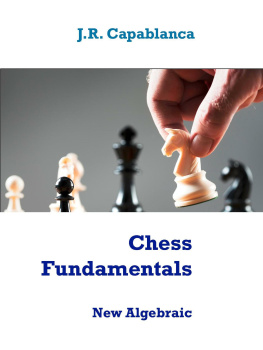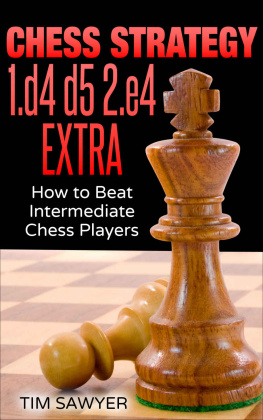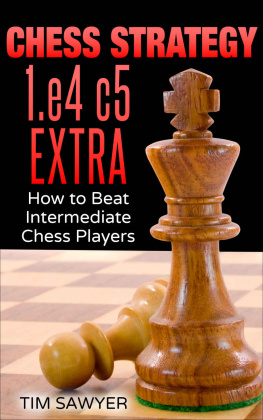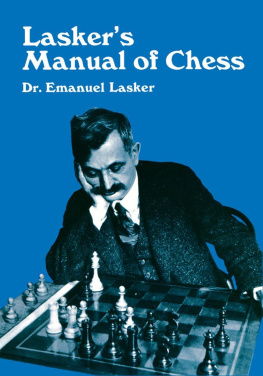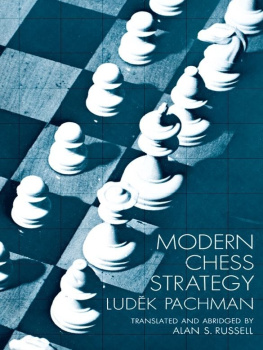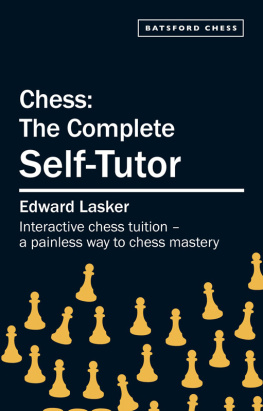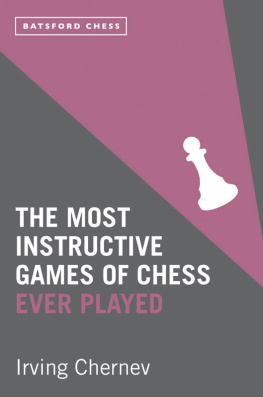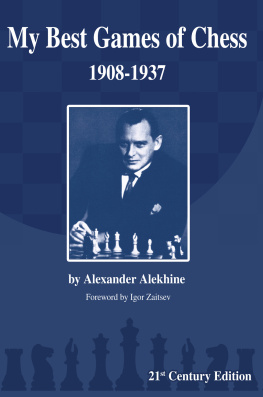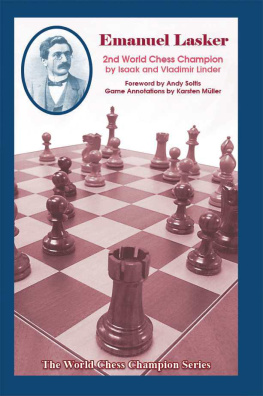Edward Lasker - Chess Strategy
Here you can read online Edward Lasker - Chess Strategy full text of the book (entire story) in english for free. Download pdf and epub, get meaning, cover and reviews about this ebook. year: 2013, publisher: Dover Publications, genre: Children. Description of the work, (preface) as well as reviews are available. Best literature library LitArk.com created for fans of good reading and offers a wide selection of genres:
Romance novel
Science fiction
Adventure
Detective
Science
History
Home and family
Prose
Art
Politics
Computer
Non-fiction
Religion
Business
Children
Humor
Choose a favorite category and find really read worthwhile books. Enjoy immersion in the world of imagination, feel the emotions of the characters or learn something new for yourself, make an fascinating discovery.
- Book:Chess Strategy
- Author:
- Publisher:Dover Publications
- Genre:
- Year:2013
- Rating:5 / 5
- Favourites:Add to favourites
- Your mark:
- 100
- 1
- 2
- 3
- 4
- 5
Chess Strategy: summary, description and annotation
We offer to read an annotation, description, summary or preface (depends on what the author of the book "Chess Strategy" wrote himself). If you haven't found the necessary information about the book — write in the comments, we will try to find it.
Chess Strategy — read online for free the complete book (whole text) full work
Below is the text of the book, divided by pages. System saving the place of the last page read, allows you to conveniently read the book "Chess Strategy" online for free, without having to search again every time where you left off. Put a bookmark, and you can go to the page where you finished reading at any time.
Font size:
Interval:
Bookmark:
BY
EDWARD LASKER
TRANSLATED BY
J. DU MONT
DOVER PUBLICATIONS, INC.
NEW YORK
Copyright 1959 by Dover Publications, Inc.
All rights reserved under Pan American and International Copyright Conventions.
This Dover edition, first published in 1959, is an unabridged republication of the second revised (1915) edition originally published by G. Bell & Sons, Ltd. This edition contains a new Preface by the author.
Standard Book Number: 486-20528-2
Library of Congress Catalog Card Number: 59-4183
Manufactured in the United States of America
Dover Publications, Inc.
31 East 2nd Street, Mineola, N.Y. 11501
I was pleased and flattered by Dover Publications offer to reprint this book that I wrote as a young student in Europe fifty years ago. It had run up a pleasantly large number of editions when the flames of Hitlerite fanaticism consumed the German version, and the British plates in the publishers words were destroyed by enemy action.
In a way, the books success reflected the rapid growth of chess popularity everywhere. But I believe it owed that success mainly to the idea that had prompted me to write it : to teach chess on the basis of general strategic principles rather than widely diversified analyses. This method unquestionably appealed to the great majority of chess students.
The chess master must thoroughly know the published analyses of openings, and he must keep up with their ever-increasing depth, or else he loses too much time in analyzing an unfamiliar variation over the board. In tournament chess where the players time is limited, this would place him at a great disadvantage. The amateur, however, has no such problems. His opponents are fairly certain to be as unfamiliar with opening analyses as he is himself. The player who better understands the characteristics that distinguish a good move from a bad one will win the majority of the games, often against adversaries of much longer practical experience.
These positional characteristics are based on a few strategic principles which are sufficiently general to make them applicable to almost any situation that may arise. Valid general principles are not apt to change; properly applied, they rule chess strategy today as they did fifty years ago.
It was most gratifying to learn from a number of famous Chess Grandmasters, among them Paul Keres and Reuben Fine, that they received their first chess instruction from my book and that it guided their chess thinking in the right direction. Not every reader is likely to become a Keres or a Fine, but I hope the book will continue to provide a solid basis from which to develop considerable playing strength without spending too much time and effort.
New York, 1960
EDWARD LASKER
As the first edition of Edward Laskers Chess Strategy was exhausted within a comparatively short time of its appearance, the author set himself the task of altering and improving the work to such an extent that it became to all intents and purposes a new book. I had the privilege of co-operating with him to a slight degree on that second edition, and was in consequence able to appreciate the tremendous amount of work he voluntarily took upon himself to do ; I say voluntarily, because his publishers, anxious to supply the strong demand for the book, wished to reprint it as it stood.
A little later I undertook to translate this second edition into English for Messrs. Bell & Sons. Only a few months had elapsed, the tournaments at Petrograd, Chester, and Mannheim had taken place, several new discoveries had been made, and it is the greatest testimony to Edward Laskers indefatigable devotion to the Art of Chess that I am able to say that this is not a translation of the second edition, but of what is practically a new book. It contains a new preface, a chapter for beginners, a new introduction, new variations. Furthermore, a large number of new games have taken the place of old ones.
I have no doubt that any chess player who will take the trouble to study Chess Strategy will spend many a pleasurable hour. Incidentally new vistas will be opened to him, and his playing strength increased to a surprising degree.
The author says in his preface that he appeals to the intelligence and not the memory of his readers. In my opinion, too, the student should above all try to improve his judgment of position.
Than the playing over of games contested by experts I can hardly imagine a greater or purer form of enjoyment. Yet I must at the outset sound a note of warning against its being done superficially, and with a feverish expectation of something happening. Every move or combination of moves should be carefully weighed, and the student should draw his own conclusions and compare them with what actually happens in the game under examination.
This applies particularly to some of the critical positions set out in diagrams in the course of the exposition of the several games.
The reader would derive the greatest possible benefit from a prolonged study of such positions before seeking to know how the games proceed. After having formed his own opinion about the merits of a particular position, he should compare the result with the sequel in the game in question, and thus find out where his judgment has been at fault.
The deeper study of the theory of the openings is of course a necessity to the student who wishes to become an expert, but the development of his judgment must precede it. To him Griffith & Whites admirable book, Modern Chess Openings, will be a perfect mine of information. There are thousands of variations, and in most of them the actual game in which they were first tried by masters is named, thus adding to the interest and value of the work.
I must not omit to mention the invaluable help afforded me by my friend Mr. John Hart, to whom my warmest thanks are due.
JULIUS DU MONT.
THE large majority of chess players who would like to improve their game, have not the necessary opportunity of pitting themselves against players of master-strength, or at least of obtaining the desired instruction from personal intercourse with them. It is for such players that the present work is intended. The books on which the learner has to rely hardly ever serve his purpose, being mostly little more than a disjointed tabulation of numberless opening variations, which cannot be understood without preliminary studies, and consequently only make for confusion. In the end the connection between the various lines of play may become clear, after the student has made an exhaustive study of the subject, but very few would have either the time or the inclination for such prolonged labour.
Therefore another shorter and less empirical way must be found in which to acquire the understanding of sound play. My system of teaching differs from the usual ones, in that it sets down at the outset definite elementary principles of chess strategy by which any move can be gauged at its true value, thus enabling the learner to form his own judgment as to the manuvres under consideration. In my opinion it is absolutely essential to follow such strategical principles, and I go so far as to assert that such principles are in themselves sufficient for the development and conduct of a correct game of chess.
Even though instruction in chess is possible on very general lines alone, yet I think it advisable and indeed necessary to explain the application of such principles to the various phases of each game of chess. Otherwise the learner might unduly delay his progress, and lose valuable time in finding out for himself certain essentials that could more profitably be pointed out to him.
Font size:
Interval:
Bookmark:
Similar books «Chess Strategy»
Look at similar books to Chess Strategy. We have selected literature similar in name and meaning in the hope of providing readers with more options to find new, interesting, not yet read works.
Discussion, reviews of the book Chess Strategy and just readers' own opinions. Leave your comments, write what you think about the work, its meaning or the main characters. Specify what exactly you liked and what you didn't like, and why you think so.


